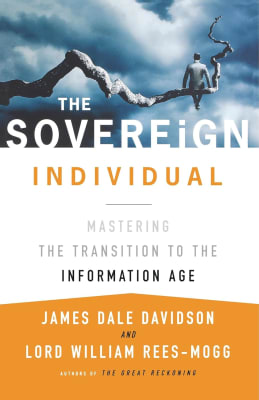
The Sovereign Individual
Mastering the Transition to the Information AgeReview
The Sovereign Individual is a thought-provoking and insightful book that explores the shifting landscape of politics, economy, and society in the 21st century. Written by James Dale Davidson and William Rees-Mogg, the book presents a compelling argument that the individual, rather than the state or institution, will be the primary unit of power and decision-making in the future.
Published in 1997, the book is remarkably prescient, predicting many of the trends and changes that have come to pass in the intervening decades. The authors contend that the rise of the sovereign individual will be driven by technological advancements, particularly in the fields of information and communication. They argue that these advancements will enable individuals to bypass traditional intermediaries, such as governments and corporations, and take control of their own lives and destinies.
One of the book's greatest strengths is its ability to synthesize a wide range of ideas and disciplines, from economics and politics to sociology and philosophy. Davidson and Rees-Mogg draw on the works of thinkers such as Friedrich Hayek, Adam Smith, and Ayn Rand, and incorporate insights from fields as diverse as cryptography, artificial intelligence, and biotechnology.
The authors also provide a detailed analysis of the decline of the nation-state and the rise of new forms of governance and organisation. They argue that the traditional nation-state is becoming increasingly obsolete, as individuals and communities turn to alternative forms of association and governance, such as virtual communities and decentralised networks.
Throughout the book, Davidson and Rees-Mogg emphasise the importance of individual freedom and autonomy, and the need for individuals to take responsibility for their own lives and decisions. They argue that the sovereign individual will be characterised by their ability to make choices and take risks, rather than relying on the state or other external authorities.
While the book is not without its flaws, its insights and predictions were remarkably astute. The authors' vision of a future in which individuals are empowered by technology and free to make their own choices is both exhilarating and unsettling. As we move further into the 21st century, it is clear that many of the trends and changes predicted in The Sovereign Individual have already come to pass.
In many respects, The book underestimates the challenges and difficulties that individuals may face in adapting to a rapidly changing world. It is overly focused on the benefits of technology and the drawbacks of the nation-state, without considering the potential downsides of a society based entirely on individualism.
Conclusion
Despite originally having being published in the late 1990's, The Sovereign Individual is still a thought-provoking and timely book that is essential reading for anyone interested in the future of politics, economy, and society. Its insights and predictions are both fascinating and unsettling, and its emphasis on individual freedom and autonomy is a powerful reminder of the importance of personal responsibility and agency, especially as we move forward in our current phase of human development.
